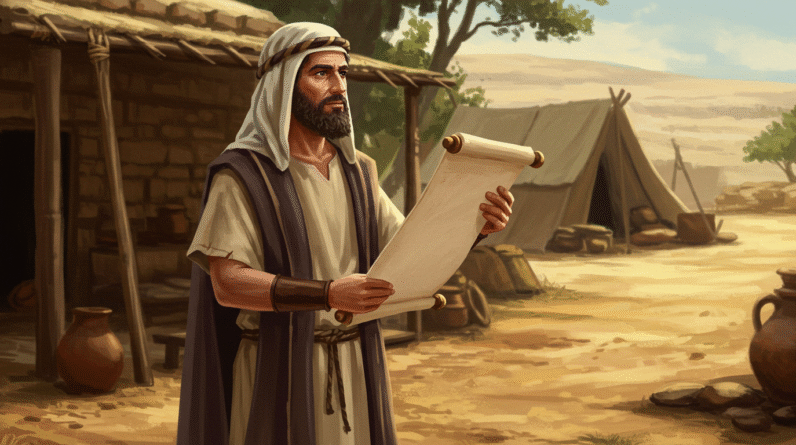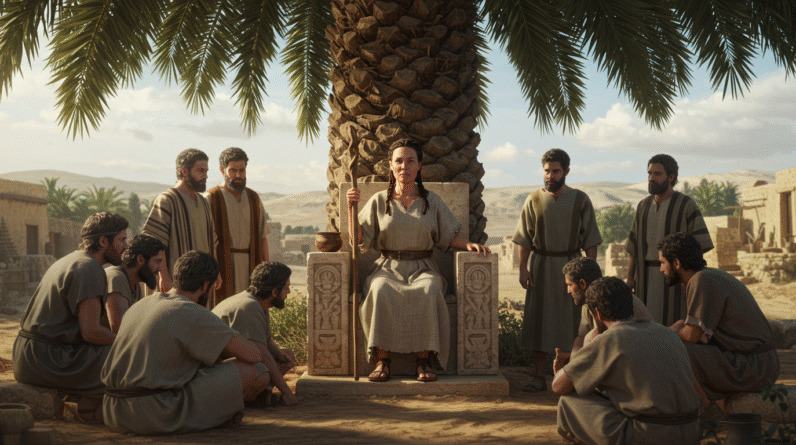Explore Samson’s story from the Old Testament, a tapestry of strength, failures, and redemption, offering profound lessons in faith and human complexity.
Samson: A Hero of Faith in the Old Testament
The enigmatic figure of Samson stands out as a unique character within the biblical narrative. Considered one of the most colorful figures in the Old Testament, Samson’s life is a tapestry woven with miraculous strength, great personal failures, and eventual redemption. His story forms a critical part of the Book of Judges, detailing his role as a Hebrew judge who led his people against their enemies, the Philistines. Understanding Samson’s life provides us with profound lessons in faith, courage, and the complexities of human nature.

Introduction
In the tapestry of ancient Israelite history, the judges play a pivotal role as liberators and leaders raised by God during turbulent times. Samson’s story, nestled in the Book of Judges, portrays him as a flawed yet fascinating hero of faith. Known for his extraordinary strength and tumultuous relationships, Samson’s narrative is not only about physical prowess but also highlights the struggles between divine purpose and personal ambition. His influence during a period of Philistine oppression marked a unique chapter in Israel’s history, making his story one of both triumph and tragedy.
Early Life and Background
Samson’s tale begins with divine intervention even before his birth. His parents, Manoah, and his wife, were childless until an angel of the Lord appeared to them, announcing that they would have a son who would begin to deliver Israel from the Philistines’ grasp (Judges 13:3-5). This miraculous announcement set the stage for Samson’s life, marking him with a Nazarite vow, a form of dedication to God that included abstaining from wine, avoiding contact with corpses, and not cutting his hair.
Samson was born at a time when the Philistines wielded considerable power over Israel. The Israelites had fallen into a cycle of sin and subjugation, finding themselves under Philistine control due to their disobedience to God. Samson’s upbringing was defined by this oppression, shaping him into a figure whose strength and temperament would eventually challenge the boundaries of Philistine dominance.
The Calling and Rise to Leadership
God’s calling for Samson was clear from birth. As he grew, the Spirit of the Lord began to stir in him, marking the beginning of his divinely ordained mission (Judges 13:24-25). Unlike other judges, Samson’s leadership was characterized more by physical might than political ingenuity or military strategy. Despite his miraculous birth and divine calling, Samson faced significant challenges as he stepped into his role. His path to leadership was fraught with personal desires that often conflicted with his divine mission.
Among the struggles Samson faced was his attraction to Philistine women, which repeatedly led him into entanglements that complicated his leadership. Despite these challenges, Samson harnessed his God-given strength in critical moments to deliver Israel from their oppressors. His leadership style was unconventional, relying largely on his vendettas against the Philistines rather than collective military campaigns.
Key Events and Victories
Samson’s life was punctuated by several key events that showcased his might and God’s intervention. One of the most famous occurrences was his slaying of a lion with his bare hands, an act that foreshadowed his future battles against the Philistines (Judges 14:5-6). However, the events following his marriage to a Philistine woman marked the beginning of his confrontations with the Philistines. In a dramatic act of retaliation, Samson burned their crops by catching 300 foxes, tying their tails together, setting them aflame, and releasing them among the Philistine grain (Judges 15:3-5).
Arguably, one of his most significant victories was at Lehi, where with divine empowerment, he single-handedly killed a thousand Philistine men using nothing more than the jawbone of a donkey (Judges 15:14-15). These acts of might were not merely personal achievements but demonstrated God’s continuing support for Israel, reinforcing their hope in divine deliverance.
Their Leadership Style
Samson’s leadership was defined by individual heroics and immense physical strength rather than strategic prowess or collaborative efforts. He embodied the characteristics of a solitary warrior, whose personal vendettas often drove his actions. Despite his failings, Samson’s obedience to God’s Spirit revealed his role as a chosen instrument of divine retribution against the Philistines.
His influence on Israel was largely through his acts of strength and defiance, providing a much-needed morale boost to a nation beleaguered by Philistine oppression. Samson’s leadership was characterized by dynamic moments where God’s power was made manifest through his strength, inspiring faith in God’s ultimate sovereignty and justice.
Challenges and Failures
Samson’s journey was riddled with significant struggles and failures. His greatest challenge was his weakness for Philistine women, leading to entanglements that compromised his mission. This is particularly evident in his relationship with Delilah, which ultimately leads to his downfall. Delilah’s betrayal resulted in Samson’s capture, blindness, and imprisonment, seemingly marking an end to his leadership (Judges 16:19-21).
Despite these setbacks, Samson’s story did not end in defeat. In his final moments, he turned back to God in humility and prayer, asking for strength one last time to defeat his enemies. His final act was one of ultimate sacrifice and redemption, as he pulled down the temple of the Philistine god Dagon, killing more Philistines in his death than throughout his life (Judges 16:28-30). This profound act illustrates that even in failure, God’s purposes can prevail when one returns to him in faith.
The Legacy of Samson
Samson’s impact on Israel extended beyond his acts of physical strength. Despite his flaws, his life demonstrated God’s faithfulness to His promises and His power to use imperfect vessels to achieve divine purposes. Samson’s narrative became a symbol of God’s enduring commitment to deliver His people, reinforcing the belief that strength and victory come from God alone.
His story also served as a cautionary tale for future generations, highlighting the dangers of straying from the divine calling for personal desires. Samson’s legacy challenged Israel and future readers to discern God’s presence in their lives and to remain faithful to their God-ordained mission.
Life Lessons and Application
Samson’s story is rich with lessons that hold relevance today. His life challenges us to recognize the divine calling and gifts within us and to use them in alignment with God’s purposes. His narrative prompts us to reflect on the importance of remaining faithful to our commitments and the hazards of succumbing to personal desires at the expense of our divine mission.
The themes of strength, repentance, and redemption in Samson’s life call us to trust in divine aid, especially during our moments of weakness. Samson’s faith in his final act serves as a poignant reminder that it is never too late to return to God and fulfill His purposes, no matter how far we may have strayed (Hebrews 11:32).

Conclusion
Samson’s story is a powerful testament to the intricate balance between human frailty and divine strength. His life teaches us about the complexity of faith and obedience, offering us a mirror to reflect on our own lives. Through his victories and failures, Samson leaves us with profound lessons on faith, leadership, and redemption. His legacy challenges us to embody our faith courageously, urging us to surpass personal desires and align our lives with divine purpose. As you ponder Samson’s story, consider how his lessons resonate with your journey and reflect on how his narrative can inspire you to deeper faith and service.
Acknowledgment: All Bible verses referenced in this article were accessed via Bible Gateway (or Bible Hub).







